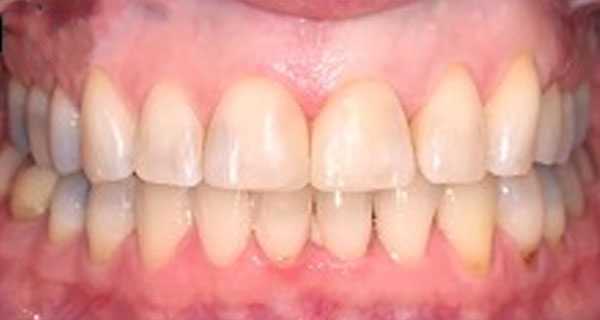Smoking & Your Teeth
Smoking can lead to tooth loss, gum disease, tooth staining and even mouth cancer.
Smoking causes a lack of oxygen in the bloodstream which means infected gums don’t heal. The blood circulation in the mouth decreases making it harder for our body to fight potential infections. Severe gum disease is called Periodontitis. This is more likely to occur in smokers who produce bacterial plaque, due to the combination of chemicals in tobacco, which can lead to gum disease.
Smoking can cause redness and tenderness in gums, blood when brushing and flossing, pain when chewing, puss oozing between teeth, receding gum line and loosening of teeth.
Our saliva flow can decrease also and this is the body’s natural wash and antibacterial break down against plaque build-up (bacteria) and dry mouth. These symptoms can also lead to damaged enamel and loss of teeth.
The nicotine and tar in tobacco can lead to teeth staining yellow in colour and for heavy smokers, over time, can be nearly brown in colour. It may also give you bad breath.
Not only can smoking lead to throat and lung cancer it can also raise the risk of mouth cancer.
What diseases are linked to smoking?
From acetone and tar to nicotine and carbon monoxide, there are no safe ingredients in tobacco. Smoking doesn’t just affect your lungs but your entire body. In addition to increasing your risk of lung cancer at least 25 times that of a non-smoker, other diseases caused by smoking cigarettes include:
- All cancers (including that of the mouth, throat, bladder, blood, and kidneys)
- Blood clotting and impaired flow (stroke, constricted blood vessels, erectile dysfunction)
- Early menopause in women (endocrine disruption, menstrual disorders, and infertility)
- Eye disease and vision impairment (macular degeneration and blindness)
- Heart disease (cardiovascular, coronary artery disease and heart attack)
- High cholesterol and type 2 diabetes
- Immune system dysfunction
- Lung damage (asthma, bronchitis, COPD, emphysema, and smoker’s cough)
- Mood swings (anxiety and irritability)
- Pregnancy complications and birth defects
- Poor oral hygiene (loss of taste, smell, decreased gum health, tooth loss)
- Unhealthy wrinkled skin and dry, brittle hair
In short, smoking cigarettes is lethal.
How to Maintain Healthy Teeth if you Smoke.
Smoking exposes you to a higher risk of complications with your oral health. The best way to protect yourself is to quit the habit, but that’s easier said than done. But, that doesn’t mean there’s nothing you can do. Smokers can still take preventive measures to reduce the harmful effects by following these oral hygiene tips.
- Brush Properly – You need to commit to your oral hygiene routine. Brush properly at least twice a day and use a good quality toothbrush. Do not subject your teeth and gums to aggressive brushing as this could cause damage to the tooth structure near the gums and also result in gum recession.
- Choose the Appropriate Toothpaste – Consider using a toothpaste specially formulated for smokers. There are toothpastes targeting nicotine and tobacco stains to help keep your teeth white. There are also the fluoride toothpaste variants that protect the gums.
- Eat more Tooth Friendly Food – Opt for food in high calcium and fibre. They help strengthen the enamel, neutralise mouth acids and act as a natural teeth cleaner. Trade some of your sweets and starchy snacks for crunchy fruits and leafy greens.
- Clean your tongue – Smokers sometimes notice a yellow, brown or black discolouration of the tongue. Using a clean toothbrush or tongue scraper to clean your tongue will improve the situation, and should ideally be performed on a daily basis.
- Rinse with a Mouthwash – According to a study, cigarette smoking promotes the growth of bacteria. To help counter this, rinse with an antibacterial mouthwash. Swish it in your mouth properly before spitting. You can ask our dentists for a mouthwash recommendation.
- Water Consumption – Frequent consumption of water can counter the dehydrating effects of smoking. It is vital for smokers to maintain a high standard of dental hygiene as they are at a higher risk of decay and gum disease. This also helps to reduce bad breath.
- Rinsing or Brushing after Smoking – Rinsing or brushing your teeth after smoking can help to reduce the degree of staining. It decreases the time the nicotine and tar sit on your teeth and gums.
- Maintain your Dental Appointments – Timely professional dental cleanings are crucial for your oral care.
Butting Out For Good with the Help of your Dental Team
Of course butting out for good is the best way to prevent smoking-related oral health issues. If you’re struggling and need help to quit smoking, talk to your dental health team or a doctor who can put together a tailored quit smoking plan.
Smile Place Dental recommend using Quitmate, a new quit smoking program that has been designed to help you quit smoking, with a group of doctors and support staff available every step of the way.
Learn more about Quitmate and book an appointment with a Quitmate doctor here.


